'Corsage' director Marie Kreutzer: 'Being beautiful is her only currency' | reviews, news & interviews
'Corsage' director Marie Kreutzer: 'Being beautiful is her only currency'
'Corsage' director Marie Kreutzer: 'Being beautiful is her only currency'
The Austrian director on Vicky Krieps, a rotting empire's rebel royal and corsetry as control
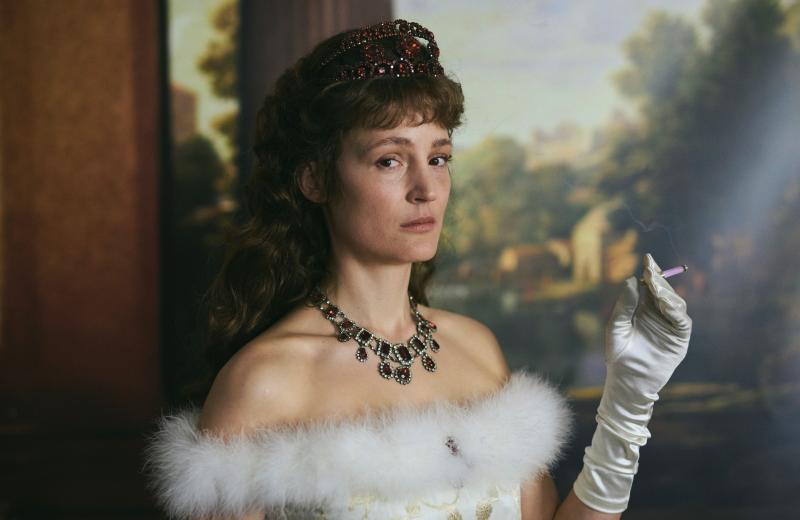
It’s 1877, and Austria’s Empress Elisabeth (Vicky Krieps) is first seen gasping under freezing water, skin blotchy with another extreme treatment to maintain her legendary beauty. Every day she constricts herself in her corset, as she’s constrained as Emperor Franz Joseph’s trophy wife. Nearing the dangerous female age of 40, the corset tightens notch by notch.
Also a fashion icon popularly known as Sissi, the Empress remains Vienna’s biggest tourist attraction, further immortalised by the fairy-tale 1950s films starring Romy Schneider. In Corsage, director Marie Kreutzer instead shows a rebel Empress resisting her hollow role: smoking, flirting, stepping out of high windows, horse-riding to the point of delirium, and skinny-dipping in a Bavarian lake as ink-black as the chocolate Mad King Ludwig pours on her dress and mouth.
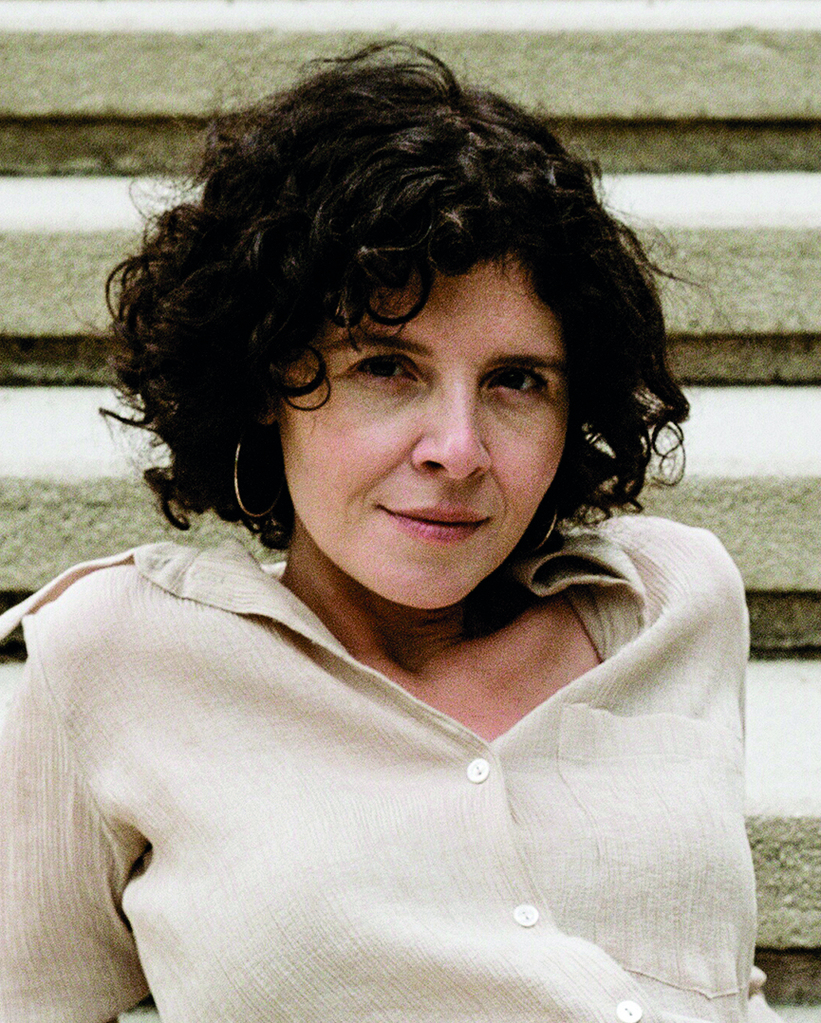 Kreutzer, pictured right, and Krieps both balance mournful severity and sly and desperate liberation. The Stones/Marianne Faithfull ballad “As Tears Go By” and Kris Kristofferson’s “Help Me Make It Through the Night” are played as courtly chamber music, adding to a line of irreverent royal biopics including Sofia Coppola’s Marie Antoinette (2006), The Favourite (2018) and TV’s Catherine the Great. Corsage has as much in common with A Royal Affair (2012), in which Alicia Vikander’s Queen Matilda is shipped off as sexual chattel to Denmark’s king, then plots revolution at court.
Kreutzer, pictured right, and Krieps both balance mournful severity and sly and desperate liberation. The Stones/Marianne Faithfull ballad “As Tears Go By” and Kris Kristofferson’s “Help Me Make It Through the Night” are played as courtly chamber music, adding to a line of irreverent royal biopics including Sofia Coppola’s Marie Antoinette (2006), The Favourite (2018) and TV’s Catherine the Great. Corsage has as much in common with A Royal Affair (2012), in which Alicia Vikander’s Queen Matilda is shipped off as sexual chattel to Denmark’s king, then plots revolution at court.
Established in Austrian cinema’s front rank by We Used to Be Cool (Was Hat Uns Bloß So Ruiniert) (2016), her first film with Krieps, and the psychiatric drama The Ground Beneath Her Feet (2019), Kreutzer’s sixth feature is her international breakthrough, winning Best Film at the London Film Festival among other accolades. Here she speaks to theartsdesk about the economy of female beauty, rotting empires and taking control.
NICK HASTED: Did the possibility of working with Vicky Krieps again attract you to this project as much as Sissi?
MARIE KREUTZER: Well, it was her idea. That was beautiful, because it feels more like our film than my film, and it was really a collaboration on many levels. Because she’s a very special actress, very in the moment, and really able to let go of all her plans she may have made before. That’s always really important to me, because some actors come on set and already have it all shot in their mind. I have to bring them back to freedom, and what’s happening in the moment. We are both well prepared, but then let go of all that.
And did you gift some of Vicky Krieps’ qualities to Sissi? Because here she’s really confrontational and liberated, as well as being literally constricted by society.
Yes, you always do that, working with actors. I don’t remember which director first said this about who – but the most beautiful thing is I get a piece of her that I don’t have to return [laughs], especially because she’s very good at improvising, and we use that a lot. I don’t say cut, I just let the camera roll, and all the actors are so disciplined that they don’t stop acting, they do something. That’s always very interesting with her, and her being so spontaneous and wild of course added a lot to the character. On the other hand, sometimes it was not easy for her to be so strict and silent, and so evil. So she also borrowed Elisabeth’s qualities sometimes!
And when you investigated Sissi, what was the essence that that made her story worth telling?
I knew that she never really wanted to be an empress, that it happened to her. She was 16 when she was married. We know from diaries and letters that I don’t think there was a single day when she enjoyed being an empress. But in her late thirties she really showed that by refusing to do certain stuff, and also doing things she was not supposed to do, like smoking in public, or leaving the country for too many days. The word “rebellion” wasn’t written down in any of the biographies. But that’s what I sensed, and that really intrigued me. You could tell a story about a tragic, sad, beautiful empress, but that’s boring. The story had to have something to say to us today, and be universal, not just a biography. And I think that a woman who is trained to please in order to be loved is still in a way every woman’s story. It was really clear to me that this would be the focus.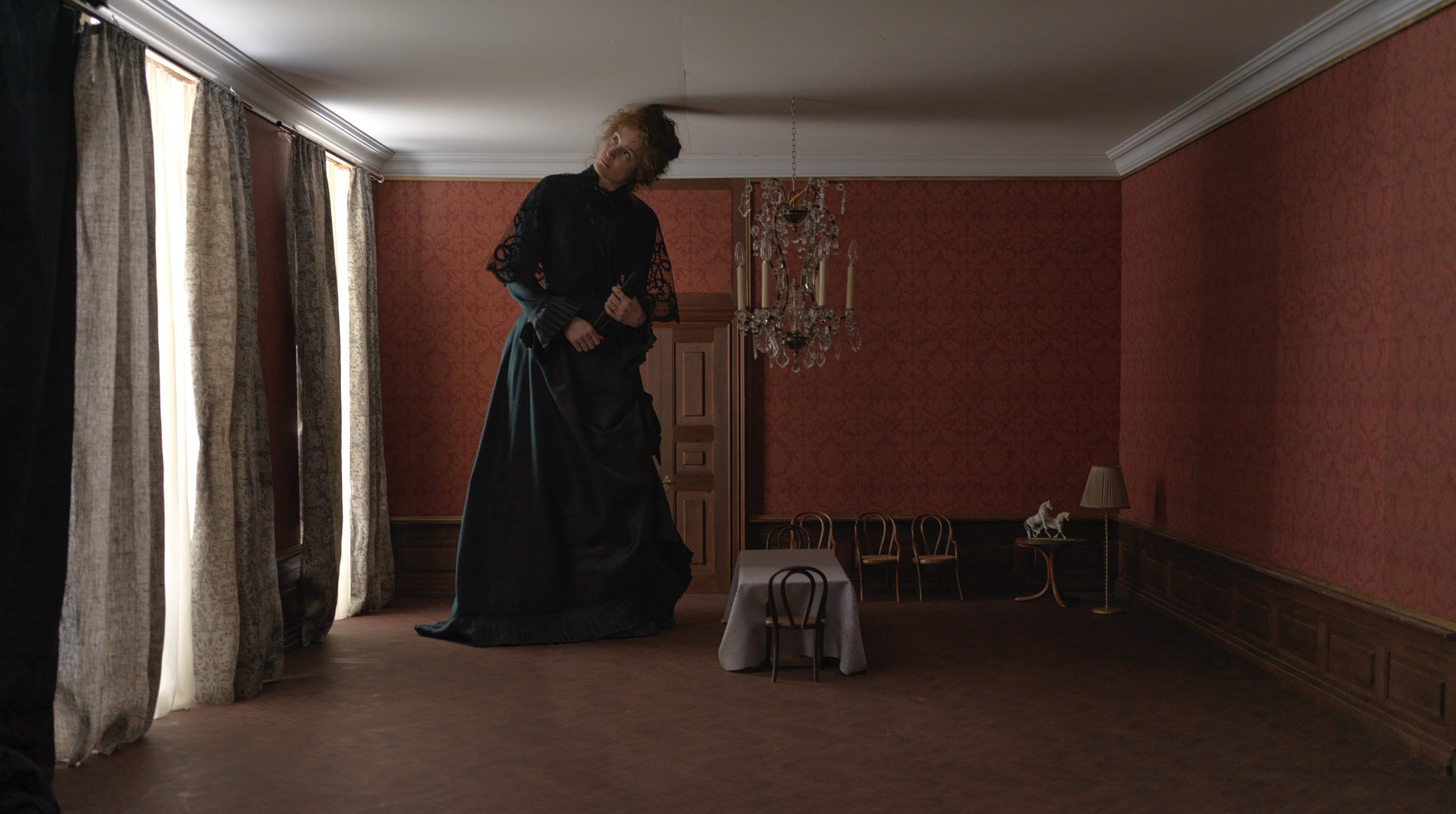 In the film she is very concerned with being seen, and not being seen. She tells her daughter, “Darkness is beautiful. It’s protection.” But on the other hand, she’s only turned on by being looked at adoringly by men.
In the film she is very concerned with being seen, and not being seen. She tells her daughter, “Darkness is beautiful. It’s protection.” But on the other hand, she’s only turned on by being looked at adoringly by men.
Yes, and I wanted to show moments where that conflict is really big. In the 25 years before that, she tried to meet those expectations and be a beautiful, representative empress and wear beautiful dresses all the time. But she knows that being beautiful and being observed is her only currency, so she has a hard time letting that go, although she’s hating it. There’s not yet something to replace it.
The corset seems like how someone who’s anorexic might act. It’s a form of self-harm and control as she tightens it.
That’s exactly what it was for me as well. It’s being hard on herself, but it’s in her control, and I don’t think a lot of things were.
Are the caged and exhausted asylum women she visits on a spectrum with Sissi’s situation?
Yeah, I think so. She was fascinated with psychiatry, and she especially liked going to psychiatric wards. There were not so many at the time, and she was interested in their innovations. My last feature film [The Ground Beneath My Feet, 2019] was about psychiatry today, and in researching that I was fascinated by images of old asylums. And why was she so drawn to it? Why was she so interested in knowing more about melancholy, and all these things that were not talked about in society? I’m sure she thought it had something to do with her.
So many things that Sissi does seem like methods of escape – she rides a horse so fast it flies, before she comes crashing down. Right through the film, is she trying to find some means of getting away?
I think so, yes. There is a lot of escaping. She travelled a lot, for weeks and months. She just didn’t want to be at home!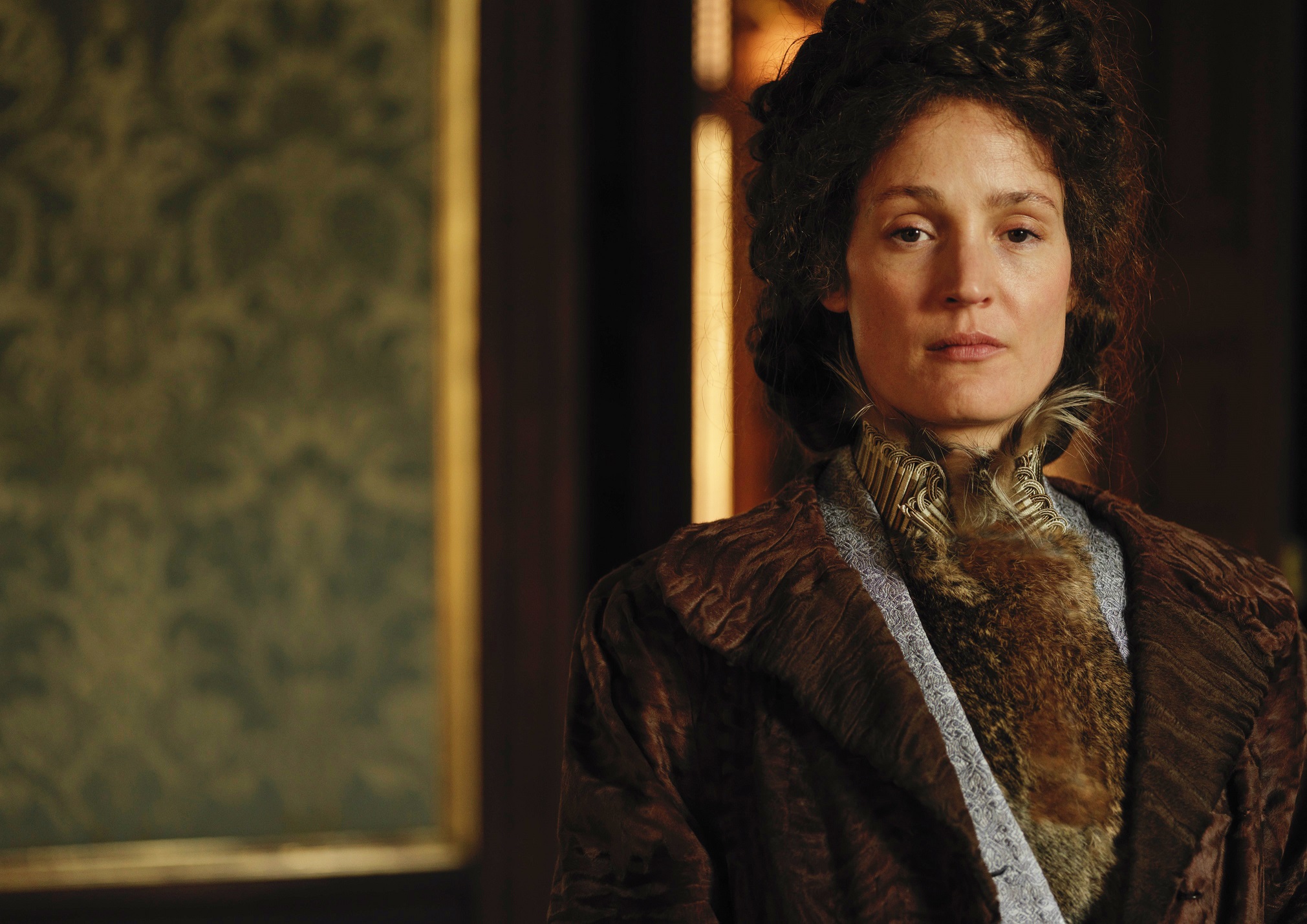 What was the meaning for you of her last 20 years? Which don’t happen in your film…
What was the meaning for you of her last 20 years? Which don’t happen in your film…
She really vanished. Because she didn’t show her face any more, after she was 40. She only walked outside with a dark veil, and there were no more real portraits. She was not seen any more. I thought this left a lot of space for speculation. As she got older, she was not provocative any more. And she was lonely, I think. At the end of the film, I thought it would be good if she could take control, and create the ending herself. So I see her as directing the final scenes. She’s creating something. It was important to me that it wouldn’t only feel sad and tragic, but also freeing. Even though a woman in the late 19th century could not be free anywhere.
You also present other iconic figures such as Ludwig of Bavaria and Franz Joseph (Florian Teichtmeister as the Emperor, pictured below) in sometimes tender ways. You strip away any iconography.
We mainly see them as private persons, behind closed doors. And we can never know what happens there. I had to make it up anyway. I always like my characters, and in this case they existed, so I had to find things I liked about them. I knew a lot about Franz Joseph already through reading about Sissi all the time. But then I thought, to take this whole thing seriously, I have to read a biography of him. And I was really moved, because he was extremely honest – "I don’t need anything for myself, it’s all for the Empire, for the people." The Hofburg had 2000 employees, he never let anyone go, they all had social security till they died, and that was not normal for anyone then. So he was extremely caring for the people, he had a kind side I hadn’t known about. The film is not about him, but I show him always being friendly to the servants, and knowing their names. Also, reading letters to her, I sense he really loved her, he just didn’t know how to deal with her. He needed a nice, quiet empress, who would do whatever she was asked. And she always made trouble, from his point of view. I had to understand that point of view also, for working with the actors. She has unkind sides as well – we all have. That’s always very important for me, to show people in all their complexity.
The Habsburg dynasty ended catastrophically for Austria, and everyone else, with World War One. Is there still nostalgia, perhaps especially in Vienna, for those imperial days?
Not in general. Now, what remains of the monarchy is mostly a tourist attraction. But to learn all the royal rules then, I had to speak to certain people. And these are a very specific society, who I think would like the monarchy to be back, and they want to protect Sissi’s image – "Make her look beautiful." The first two experts we worked with asked for their names to be taken off the credits – "No, this is not the image we want used." But that’s more nerdy, it’s not the usual public opinion!
Is there a palette to this film? There seem to be a lot of greens which make it look like Sissi’s living underwater, and autumnal browns.
Most of it was shot on location, so we had to work with what we had. But it was clear to me, when you got to the Hofburg [the Habsburgs’ former imperial palace], and the rooms in places where she lived, everything is always red, white and golden. And I didn’t like that. I said to my production designer, let’s look for castles which are darker – more blue, more green, more brown. Not the typical colours you always see in films about Sissi and the Austrian Empire. We wanted it to be darker and more rotten, and not so neat and beautifully renovated. The look was that the expensive furniture had already been sold. Because to Elizabeth it was already clear that the monarchy wouldn’t last forever. She talked about it to her son Rudolf. There was a lot of trouble already. We wanted to reflect that on a visual level. It was always important to have a certain darkness to the rooms. Because I went to her apartments several times. It’s really close to my home, and you can walk through the rooms. And they are beautiful big rooms, but the windows always look out to grey yards, so it feels like a very dark, beautiful jail. The feeling of those rooms really inspired us, we really tried to capture that.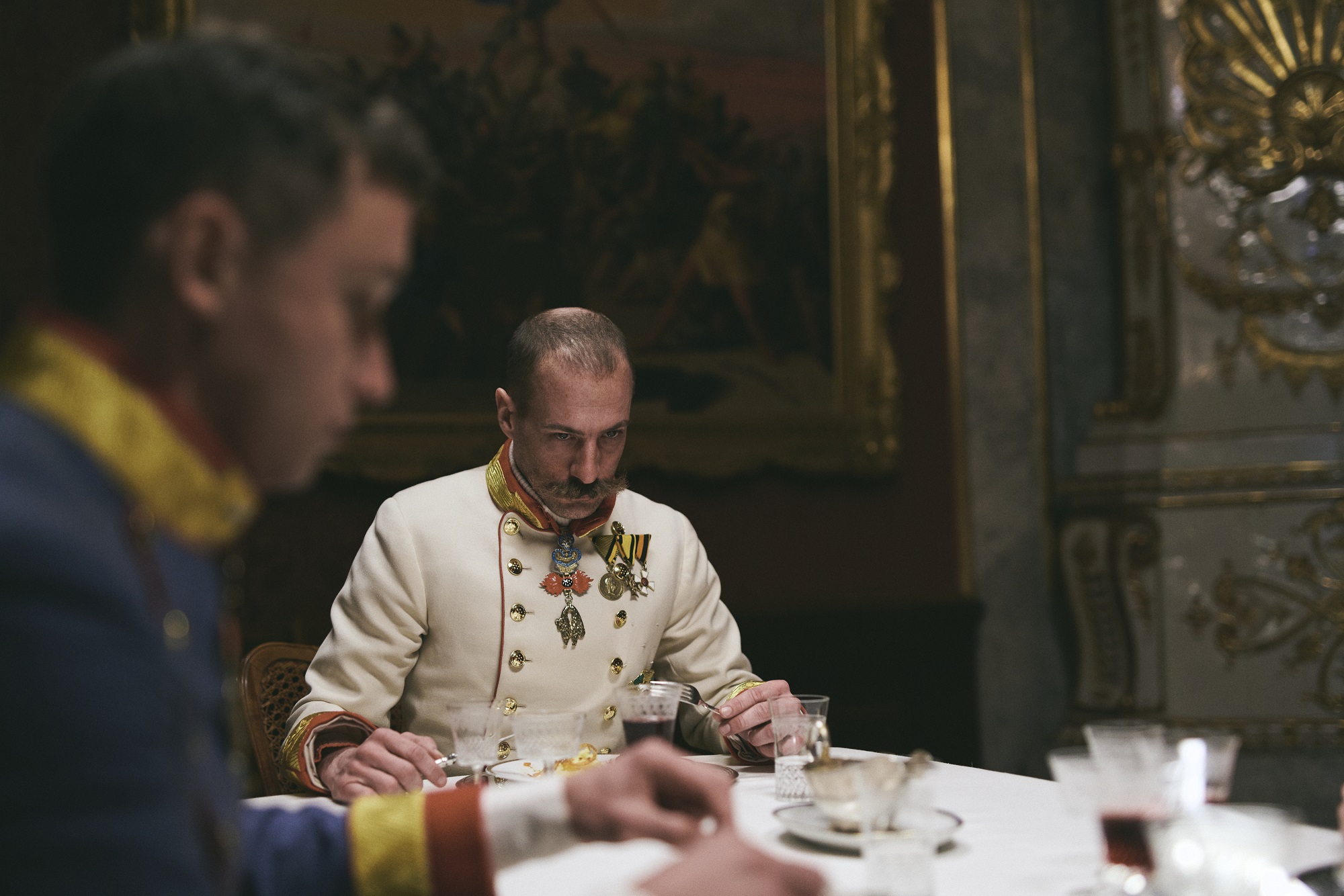 Why did you put Sissi in a proto-silent movie by Louis Le Prince [who likely shot the first motion-picture footage in 1888]?
Why did you put Sissi in a proto-silent movie by Louis Le Prince [who likely shot the first motion-picture footage in 1888]?
I’m on my own when I’m writing, with my photography and music and mood-boards, and then finally you’re in the flow, so I don’t remember. I was reading about him, unconnected to the film. And when I’m writing, anything can influence me. When I’m writing in a coffee shop and somebody’s talking about something in the next table, that may end up in the screenplay. And I like films in films as well. In the first film I did with Vicky, she plays a young director doing a documentary on 16mm, and we had that 16mm material in the film. I thought it would be a good opportunity to show Sissi another possible image of herself.
Did you use anachronistic songs such as “As Tears Go By” to jar the film further out of period conservatism – to make it feel more alive?
I didn’t think about that so much. I’m listening to so much music when I’m writing, and sometimes these songs get into the script. None of my films have classic film scores, I’m not interested in that, and especially not for this film, where I didn’t want to make a classical period film. But I didn’t want it to be too obviously modern. This was not the idea. It was just the music I liked for the film. And I came up with the idea of integrating it more in scenes and having it played live, by instruments which already existed. So it should give you a feeling that this song could have existed at that time.
How has the film been received in Austria? And is there any transgression to this Sissi, compared to the more chocolate-box version with Romy Schneider that is so familiar?
I don’t read any reviews, to protect myself, but someone would tell me if a journalist wrote, "You can’t do this to Sissi!" The PR, poster and trailer did a really good job of showing this isn’t a typical Sissi film. It came out in cinemas here in July, and it’s still on in three cinemas here in Vienna, and that makes me extremely happy, because especially post-Covid the audience numbers here are terrible, and for an Austrian film to be in cinemas so long, that’s maybe the biggest success I’ve had with this film! Austrians don’t really like their own stuff if it’s not loved anywhere else. Now the film has a lot of positive resonance from other countries, they’re proud of it. That’s really typical here. If people abroad say it’s good, then it’s good. I hear that in different museums, when they show people around Sissi stuff, they even tell the tourists, "And now we have the film, Corsage!" [laughs] So now they’re even proud of it, it seems!
- Corsage is in cinemas now
- More film reviews on theartsdesk
Explore topics
Share this article
The future of Arts Journalism
You can stop theartsdesk.com closing!
We urgently need financing to survive. Our fundraising drive has thus far raised £49,000 but we need to reach £100,000 or we will be forced to close. Please contribute here: https://gofund.me/c3f6033d
And if you can forward this information to anyone who might assist, we’d be grateful.

Subscribe to theartsdesk.com
Thank you for continuing to read our work on theartsdesk.com. For unlimited access to every article in its entirety, including our archive of more than 15,000 pieces, we're asking for £5 per month or £40 per year. We feel it's a very good deal, and hope you do too.
To take a subscription now simply click here.
And if you're looking for that extra gift for a friend or family member, why not treat them to a theartsdesk.com gift subscription?
more Film
 Blu-ray: Finis Terrae
Bleak but compelling semi-documentary, filmed on location in Brittany
Blu-ray: Finis Terrae
Bleak but compelling semi-documentary, filmed on location in Brittany
 Oslo Stories Trilogy: Sex review - sexual identity slips, hurts and heals
A quietly visionary series concludes with two chimney sweeps' awkward sexual liberation
Oslo Stories Trilogy: Sex review - sexual identity slips, hurts and heals
A quietly visionary series concludes with two chimney sweeps' awkward sexual liberation
 Sorry, Baby review - the healing power of friendship in the aftermath of sexual assault
Eva Victor writes, directs and stars in their endearing debut feature
Sorry, Baby review - the healing power of friendship in the aftermath of sexual assault
Eva Victor writes, directs and stars in their endearing debut feature
 Blu-ray: Who Wants to Kill Jessie?
Fast-paced and visually inventive Czech comedy
Blu-ray: Who Wants to Kill Jessie?
Fast-paced and visually inventive Czech comedy
 Oslo Stories Trilogy: Love review - freed love
Gay cruising offers straight female lessons in a heady ode to urban connection
Oslo Stories Trilogy: Love review - freed love
Gay cruising offers straight female lessons in a heady ode to urban connection
 Beating Hearts review - kiss kiss, slam slam
Romance and clobberings in a so-so French melodrama
Beating Hearts review - kiss kiss, slam slam
Romance and clobberings in a so-so French melodrama
 Materialists review - a misfiring romcom or an undercooked satire?
Writer-director Celine Song's latest can't decide what kind of film it is
Materialists review - a misfiring romcom or an undercooked satire?
Writer-director Celine Song's latest can't decide what kind of film it is
 theartsdesk Q&A: actor Leonie Benesch on playing an overburdened nurse in the Swiss drama 'Late Shift'
The Guildhall-trained German star talks about the enormous pressures placed on nurses and her admiration for British films and TV
theartsdesk Q&A: actor Leonie Benesch on playing an overburdened nurse in the Swiss drama 'Late Shift'
The Guildhall-trained German star talks about the enormous pressures placed on nurses and her admiration for British films and TV
 Freakier Friday review - body-swapping gone ballistic
Lindsay Lohan and Jamie Lee Curtis's comedy sequel jumbles up more than their daughter-mother duo
Freakier Friday review - body-swapping gone ballistic
Lindsay Lohan and Jamie Lee Curtis's comedy sequel jumbles up more than their daughter-mother duo
 Eight Postcards from Utopia review - ads from the era when 1990s Romania embraced capitalism
Radu Jude's documentary is a mad montage of cheesy TV commercials
Eight Postcards from Utopia review - ads from the era when 1990s Romania embraced capitalism
Radu Jude's documentary is a mad montage of cheesy TV commercials
 The Kingdom review - coming of age as the body count rises
A teen belatedly bonds with her mysterious dad in an unflinching Corsican mob drama
The Kingdom review - coming of age as the body count rises
A teen belatedly bonds with her mysterious dad in an unflinching Corsican mob drama

Add comment